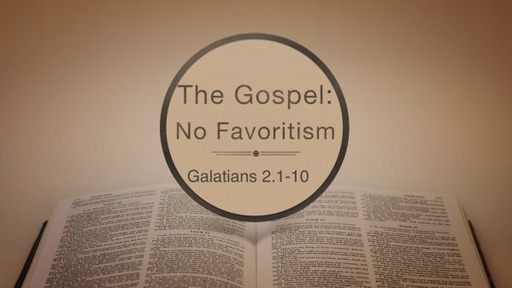The Gospel: No Favoritism

Notes
Transcript
Sermon Tone Analysis
A
D
F
J
S
Emotion
A
C
T
Language
O
C
E
A
E
Social
What is essential?
What is essential?
Early on in the pandemic we had this question posed many of times; did we not? It was frustrating and liberating, at least to me, with some of the answers. Yes, it meant some of the things which were “important”, “crucial” and I would call “essential” ended up not being as essential as I thought.
If everything is essential, nothing is essential!
If everything is essential, nothing is essential!
This may be hard for us to grasp but if everything is essential in some manner than by definition nothing is essential.
We in the church, IMO, need to re-learn this. We must be careful to not major on the minors and lose focus on the major issues.
Independence is never the goal.
Independence is never the goal.
Paul spends chapter 1 talking and indicating his independence from others but now we have what seems to be a “change of face”.
Church unity is the issue.
Church unity is the issue.
The early church is experiencing great growth and with growth comes pain. Anyone with children knows this to be true.
One way to have “unity” is to all be the same.
One way to have “unity” is to all be the same.
We must all look the same, dress the same, believe the same, practice our faith the same, etc. For the Judaizers, or false brothers as Paul calls them, they wanted everyone in the faith to be “good Jews”.
True unity is diversity under Jesus.
True unity is diversity under Jesus.
Jesus did not come to make us all the same. He came to make us new.
God doesn’t see “faces”, he sees faith.
God doesn’t see “faces”, he sees faith.
This is the part about favoritism and so forth. This is not “new” in regards to Jesus. It has been and always will be part of God’s character. One can “look” the part but God doesn’t want looks he wants hearts.
The Gospel is powerful enough to work in different contexts.
The Gospel is powerful enough to work in different contexts.
This is what we see the early church start to proclaim. Peter’s context was not Paul’s context. As the world changes the Gospel is able to reach this “new world” but it may mean the method must also change.
We live in community.
We live in community.
This community is typically defined by neighborhood, those around us, and locally. Yet, we see in these verses that community is much broader than just a location. Paul was asked to continue to remember the poor in Jerusalem.
We create community by serving.
We create community by serving.
This is what Paul and the Gentile church did.
We create community by being together.
We create community by being together.
If we only are together with those who are different we are not creating community, we are creating sameness.
The Gospel forms, reforms, and transforms communities.
The Gospel forms, reforms, and transforms communities.
This is not an easy task nor one we will always like. Sameness is preferred because it is familiar and comfortable. Diversity is hard. Diversity is uncomfortable. Diversity is necessary.
The Gospel of, in, and through Jesus MUST be central.
The Gospel of, in, and through Jesus MUST be central.
This is the major issue at stake in our passage and our world.